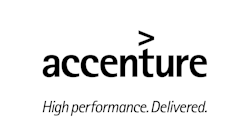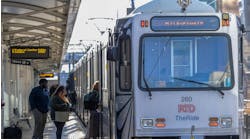DC: Metro Awards Accenture Major Contract for New Electronic Fare Payment System
Metro announced Jan. 8 that the Authority will begin testing a new electronic payment program after awarding Accenture the contract to replace the existing fare collection systems for Metrorail, Metro-operated parking facilities, Metrobus and MetroAccess services.
The $184 million contract was awarded on a best value basis, following a competitive procurement process that included an examination of the technical capabilities of the shortlisted companies and their proposals, historical performance, and value for money.
The new system will be designed to provide a state of the art system for Metro customers that enables them to continue to use SmarTrip cards, while expanding fare payment to chip-enabled credit cards, federal government ID cards, and mobile phones using near field communications (NFC).
“While Metro pioneered the tap and go system we currently use, by today’s standards that system is cumbersome and the technology is not sustainable,” said Metro General Manager and CEO Richard Sarles. “The new technology will provide more flexibility for accounts, better reliability for riders, and real choices for customers to use bank-issued payment cards, credit cards, ID cards, or mobile phones to pay their Metro fares.”
Washington Metro will be among the first transit systems in the United States to use this advanced technology to enhance reliability, and make travel more convenient for riders. Accenture will help deliver the electronic fare management system by combining its transit experience with industry and functional management consulting expertise in mobility, analytics, customer service, payments, financial services, retail and marketing science. Accenture has successfully implemented similar technology in Canada and the Netherlands.
“Consumers want to see new payment approaches that enable choice and are easy for them to adopt, whether it be contactless payment cards, mobile phone or even today’s SmarTrip card,” said Paul Loftus, senior managing director with accenture. “We are pleased to be helping Metro meet customers’ current and future fare management needs.”
The system will be built using the Accenture Fare Management Solution, based on commercially off-the- shelf software products. It will use an open architecture that supports a range of payment options and includes the flexibility for future evolution in payment technology.
Later this year, Accenture will provide a pilot program to test the new system in 10 Metrorail stations, aboard 50 branded-route Metrobuses, and in two parking lots. Additionally, 2,000 Metro riders will be selected to participate in the pilot program to test the performance and reliability of the new system.
"We are pleased to be working with an experienced company to bring our customers the same level of technology that we've all seen in the airlines and banking industries for payments,” said Metro Deputy General Manager of Administration and Chief Financial Officer Carol Kissal. “Over the next several years, customers will see new stainless steel faregates with clamshell-like barriers and large, bright, intuitive displays to ease their entries and exits. We believe this new system will enhance the Metro experience for commuters and visitors alike.”
Similarly, fare vending machines will have large, intuitive, multilingual displays and be fully ADA-compliant. Onboard Metrobus, there will be a new target for customers to tap and MetroAccess customers will be able to validate their trips using the driver’s smartphone and the customer’s ID card.
Metro anticipates lower ongoing maintenance costs as a result of the more modern, component-based technology. Travel transactions and fare calculations will be performed by a central data system which is easier to maintain and manage. In addition, a sophisticated equipment monitoring system to manage maintenance and repair functions will support higher equipment up-time for customers.
When fully deployed, customers will see approximately 1,000 faregates including ADA faregates, 450 fare vending machines, approximately 1,500 bus payment targets, approximately 160 new payment targets at parking exit lanes, and approximately 600 NEPP-compatible smartphones for MetroAccess operators. The new system will not accept paper tickets and Metro will continue the gradual phasing out of paper fare media. Today, less than one in ten Metrorail riders pay for their trip with a paper farecard.



